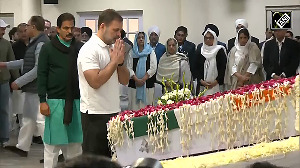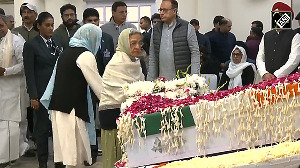Former national security adviser Brajesh Mishra has strongly opposed a nuclear bill that will gain India a crucial exemption under American laws and enable the implementation of the nuclear deal between India and the United States.
The bill was cleared by the House International Relations Committee and will next come up at the US Congress.
Mishra told rediff.com that the bill is 'obviously an attempt by the US to subjugate India's foreign policy'.
The bill also has provisions to seek India's 'full and active' participation in curbing Iran's nuclear ambitions and halt increase of atomic arms arsenals in South Asia.
The bill also says that the US aims to 'secure India's full participation in United States efforts to dissuade, isolate, and, if necessary, sanction and contain Iran's efforts to acquire a nuclear weapons capability, the capability to produce other weapons of mass destruction, and the means to deliver such weapons'.
Mishra said: "The US wants our strategy in this part of the world to suit their needs, thinking on Iran and other issues. And, obviously, a country as large and as independent-minded as India cannot accept that.
"Whatever India decides to do about Iran and other subjects that will come up in future will be decided by keeping in mind India's requirements it's own strategy.
"So, the bill is setting up a situation where a conflict of interest between India and US arises, and this is not in a long term interest of Indo -US relations."
Among those who disagree with Mishra is Indian Ambassador Ronen Sen. He says that the clauses could be a strong reflection of the traditional thinking on non-proliferation.
In New Delhi, external affairs ministry sources said that these suggestions and expectations of US are 'non-binding' and similar terms were also used in nuclear pact authored by US with China and Japan, too.
But, Mishra doesn't think so. He says: "A lot of propaganda is going on to indicate that India need not bother about these postulates. That [such conditions] will not be binding on India is merely technically correct."
"Two, three or four years down the road if there is a conflict of views between India and US on foreign policies, future administrations can always come out and say India has violated the terms of the bill that was passed by Congress. And, at that stage, suppose, if Congress decides to stop co-operation with India, what then?" he wonders.
Mishra also said future Indian governments will not be bound by the promises that the Manmohan Singh government has made to the US.
"Where is the consensus within India? The opposition parties have not been consulted. There is a substantive majority in Parliament which is not in favour of this Nuclear deal," he said.
Asked what whether such a stand-off between the government and the opposition will harm India's improving international image, Mishra said, "If it reflects negatively outside India, shouldn't the government be bothered about that? It's not only the opposition parties' responsibility to look after the image of India. It's the primary responsibility of the government and the opposition can not be found at fault."
The proposed bill also says firmly that US wants to 'achieve the declaration of a moratorium on the production of fissile material for nuclear purposes by India, Pakistan, and the People's Republic of China at the earliest possible date'.
Regarding this aspect, Mishra said, "The US wants to achieve, at the earliest, the conclusion and implementation of a treaty banning the production of fissile material for nuclear weapons to which both the United States and India become parties."
Mishra, who has extensively dealt with FMCT negotiations in past, said, "For many years, this government and previous governments have supported the efforts in Geneva in the Conference of Disarmament to negotiate the treaty on Fissile Material cut off.
"This has been held up because of the differences amongst the important members. I believe that India has an attitude and a negotiating position that is different from the US and we must stick to our position and not follow blindly on the proposal put forward by the US in the Geneva Conference."
Summing up the crucial bill, Mishra said, "The bill is forcing India to take the US lead on the issue; therefore, I am against the deal."






 © 2024 Rediff.com -
© 2024 Rediff.com -